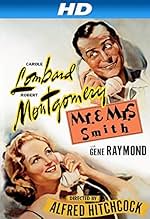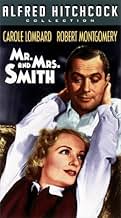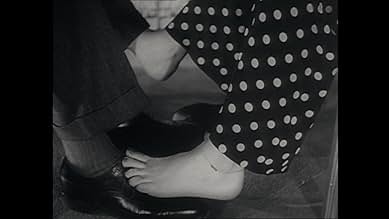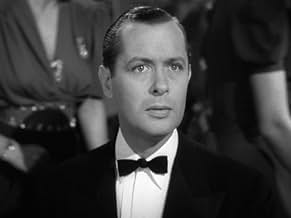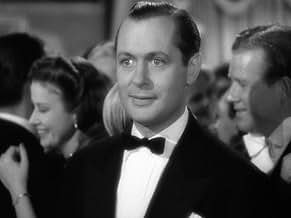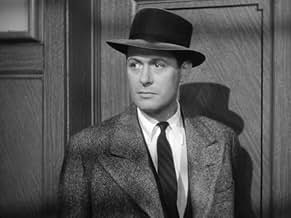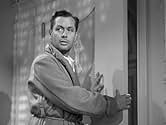AVALIAÇÃO DA IMDb
6,3/10
12 mil
SUA AVALIAÇÃO
Adicionar um enredo no seu idiomaA couple who have been married for three years are shocked to learn that their marriage is not legally valid.A couple who have been married for three years are shocked to learn that their marriage is not legally valid.A couple who have been married for three years are shocked to learn that their marriage is not legally valid.
Pamela Blake
- Lily
- (as Adele Pearce)
Ernie Adams
- Bellhop
- (não creditado)
Ernie Alexander
- Bellhop at Lodge
- (não creditado)
Murray Alper
- Harold - Taxi Driver
- (não creditado)
Tex Brodus
- Nightclub Patron
- (não creditado)
Avaliações em destaque
This is a good example of a movie that could be quite disappointing for anyone who had too many or too specific expectations for it. It's an Alfred Hitchcock movie, but it's not at all like any of his better-known films. The offbeat premise leads you to expect a 1930s-style screwball comedy, but instead it has a different brand of humor altogether.
The tone of the film blends together the screwball plot idea with Hitchcock's dry sense of humor and the upbeat charm of Carole Lombard. It's something of an odd combination, but it works all right as long as you don't have too many preconceptions.
Lombard and Robert Montgomery work well as "Mr. & Mrs. Smith", who find out at the beginning of the movie that they are not really married. Most of the story that follows moves at a decent pace, and although there are never any big laughs, there is some good material. It never really hits high gear, but once you get used to the pace, most of it works well enough.
It does slow down quite a bit towards the end, as things run out of steam, and this keeps the movie from being better. A grand climax in the screwball tradition might have made it a very good movie. Instead, as it is, "Mr. & Mrs. Smith" is a pleasant, generally amusing, slightly above-average romantic comedy.
The tone of the film blends together the screwball plot idea with Hitchcock's dry sense of humor and the upbeat charm of Carole Lombard. It's something of an odd combination, but it works all right as long as you don't have too many preconceptions.
Lombard and Robert Montgomery work well as "Mr. & Mrs. Smith", who find out at the beginning of the movie that they are not really married. Most of the story that follows moves at a decent pace, and although there are never any big laughs, there is some good material. It never really hits high gear, but once you get used to the pace, most of it works well enough.
It does slow down quite a bit towards the end, as things run out of steam, and this keeps the movie from being better. A grand climax in the screwball tradition might have made it a very good movie. Instead, as it is, "Mr. & Mrs. Smith" is a pleasant, generally amusing, slightly above-average romantic comedy.
When I put this movie on I was drowsy, and depressed. It did two things for me after I put it on. It kept me awake, thus entertaining me, and it put a smile on my face.
There are some genuine laughs in this movie, and the comedy is spread between all the characters. Robert Montgomery is extremely funny, with both excellent physical comedy, and great comedic timing with his dialogue. What surprised me most was the excellent comedic timing of Carole Lombard. She is extremely funny, but her chemistry with Montgomery in their scenes together is fantastic.
The direction, of course, is excellent. Not standard Hitchcock suspense, but classic Hitchcock comedy and romance, elements of his film making that a lot of people overlook.
Honestly, this is a fun movie. The humor is intelligent and never sinks to an infantile level. I had never heard of this movie until about two days ago, and I watched it and I was pleasantly surprised. 8 out of 10.
There are some genuine laughs in this movie, and the comedy is spread between all the characters. Robert Montgomery is extremely funny, with both excellent physical comedy, and great comedic timing with his dialogue. What surprised me most was the excellent comedic timing of Carole Lombard. She is extremely funny, but her chemistry with Montgomery in their scenes together is fantastic.
The direction, of course, is excellent. Not standard Hitchcock suspense, but classic Hitchcock comedy and romance, elements of his film making that a lot of people overlook.
Honestly, this is a fun movie. The humor is intelligent and never sinks to an infantile level. I had never heard of this movie until about two days ago, and I watched it and I was pleasantly surprised. 8 out of 10.
Yes, this is an Alfred Hitchcock film, albeit a very different one. The Master of Suspense crosses over to the screwball comedy genre in the 1941 film 'Mr and Mrs Smith'. It's an interesting, yet ultimately flawed exercise.
Hitch filmed 'Mr and Mrs Smith' primarily because of his desire to work with the lovely Carole Lombard. She herself desperately wanted to work with Hitch, though not in a suspense film. He obliged with this piece, also starring comedy regular Robert Montgomery.
The somewhat convoluted plot has Montgomery and Lombard as husband-and-wife David and Ann Smith. One fine day Lombard questions Montgomery over the dinner table with the line 'If you had it all to do over again, would you still have married me?' His reply of 'Honestly, no' is not what she had been expecting. Coincedentally, on the same day David and Ann discover that, due to a technical glitch, they aren't really married after all. Like all, screwball set-ups, havoc quickly ensues.
The problem with Mr and Mrs Smith is that too many jokes simply fall flat on their face. The film does not have enough gags that truly work, with only a few moments that gain a genuine smile. Also, Lombard's character is also portrayed at many times as being unnecessarily cruel. Overall, Lombard and Montgomery play their roles very well, Lombard shines as usual, but the magic just isn't there. There a few good scenes, and probably the funniest is when Montgomery tries to make Lombard jealous in a restaurant.
It's remarkable that this is a Hitchcock film- it feels so American in style. A fun side point to note is that this film contains possibly the first Italian 'Pizza-Pasta' joint in America ever to be put on film.
It's a tragedy that Carole died the following year in a plane crash. She was a great comedic actress who may have blossomed into one of Hitchcock's 'cool blondes' in a suspense film. She certainly had the potential.
6/10
Hitch filmed 'Mr and Mrs Smith' primarily because of his desire to work with the lovely Carole Lombard. She herself desperately wanted to work with Hitch, though not in a suspense film. He obliged with this piece, also starring comedy regular Robert Montgomery.
The somewhat convoluted plot has Montgomery and Lombard as husband-and-wife David and Ann Smith. One fine day Lombard questions Montgomery over the dinner table with the line 'If you had it all to do over again, would you still have married me?' His reply of 'Honestly, no' is not what she had been expecting. Coincedentally, on the same day David and Ann discover that, due to a technical glitch, they aren't really married after all. Like all, screwball set-ups, havoc quickly ensues.
The problem with Mr and Mrs Smith is that too many jokes simply fall flat on their face. The film does not have enough gags that truly work, with only a few moments that gain a genuine smile. Also, Lombard's character is also portrayed at many times as being unnecessarily cruel. Overall, Lombard and Montgomery play their roles very well, Lombard shines as usual, but the magic just isn't there. There a few good scenes, and probably the funniest is when Montgomery tries to make Lombard jealous in a restaurant.
It's remarkable that this is a Hitchcock film- it feels so American in style. A fun side point to note is that this film contains possibly the first Italian 'Pizza-Pasta' joint in America ever to be put on film.
It's a tragedy that Carole died the following year in a plane crash. She was a great comedic actress who may have blossomed into one of Hitchcock's 'cool blondes' in a suspense film. She certainly had the potential.
6/10
Stunning and watchable classic comedy with Carole Lombard and Robert Montgomery in sparkling form, adding strong secondary cast. A couple David Smith (Robert Montgomery) and Ann Smith (Carole Lombard) who have been married for three years are shocked to learn that their marriage is not legally valid and go through courtship all over again. They then decide to take new lives and different paths. Ann's new life is dating other men. One of those other men and the most serious is David's best friend and business partner, Jefferson Custer (Gene Raymond). A Million Smiths in America...And these are the funniest! A slightly daffy comedy about a slightly daffy couple !. Learn about love from this scrap-happy couple who were locked up till they made up!. The Flirting Mr. And The Flitting Mrs. Who Ran Their Marriage By Rules!. Whwn thwy loved...they hold hands...to keep from killing each other!. She loves him! She hates him! -and you have all the fun! . Carole's in a comedy again-and What a comedy! The daringly delightful story of a bride who couldn't stay mad!. Love and Laugh with the flirting Mr. And the flitting Mrs. Who ran their marriage by rules--until a rule that wasn't in the book almost ran their marriage on the rocks...Red Book Magazine says it's the most explosive and hilarious comedy of 1941--and you won't argue!. It's Daring! It's Delightful--And as Spicy as It's Speedy!. The All-Time Prize Panic of the Screen
Hitchcock's only screwball and sophisticated comedy, an underrated, endearing farce about a bickering but happy modern couple who discover their marriage isn't legitimate and go through courtship all over again. Vintage of its kind, with inspired interpretations and crackling dialogue in which Lombard and Montgomery get hitched as they're getting unhitched. An amusing, gentle classy comedy about 'War of the Sexes' , including entertaining events, funny incidents , disconcerting situations and lots of fun. The screen team made up of Carole Lombard and Robert Montgomery is frankly marvellous, but never more so than in this classic comedy. As husband and wife on opposing sides, they remind us of what film magic is really all about. Riotously directed by Alfred Hitchcock who now lends to laughter that touch of genius which was so evident in his "Rebecca" and "Foreign Correspondent". Less Hitchcock, however, than writer Norman Krasna, who at his best could twist conventional roles and plot patterns in such beguiling ways that you'd almost forget their antiquity. The terrific duo of protagonists: Lombard and Montgomery are well accompanied by a fine support cast , such as: Gene Raymond, Jack Carson, Philip Merivale, Lucile Watson, William Tracy, among others.
Competently directed by Alfred Hitchcock and it is still a good and stylish film. Hitchcok had a long 50-year career. Hitch's early British period when he directed silent films such as the successful ¨The lodger¨ (1926) , ¨The ring¨(1927) , ¨Easy virtue¨ (1927) , ¨The Manxman¨(29) ; being ¨Blackmail¨(29) made as a silent , this was reworked to become a talkie . Following sound movies and early talkies as ¨June and the Paycock¨(30) , ¨Skin Game¨(31) , ¨Rich and strange¨(32) , ¨Number 17¨(32) , ¨The man who knew too much¨(34) , ¨The 39 steps¨ (35) , ¨The secret agent¨(36) , ¨Blackmail¨(36) , ¨The lady vanishes¨(38) . After ¨39 Steps¨ and ¨Jamaica Inn¨, Hitch was encouraged to go to America and quickly filmed his first work in Hollywood hired by the great producer David O'Selznick to shoot ¨Rebecca¨ and after ¨Suspicion¨, ¨Notorious¨ and ¨Spellbound¨. Because Hitch felt controlled by O'Selznick, he founded his own company Trasatlantic along with Sidney Bernstein with which he produced ¨Rope¨ and the flop ¨Under Capricorn¨. Hitchcock went to to fascinate the public with several films such as: ¨Strangers on a Train¨,¨Rear Window¨, Vertigo¨, ¨The Man who Knew Too Much¨, ¨North by Northwest¨, ¨To Catch a Thief¨, ¨The Birds¨, ¨Topaz¨, ¨Torn Curtain¨, ¨Frenzy¨ or ¨Psycho¨that comes near his best. And ¨Mr. And Mrs. Smith¨was the only non-thriller directed by Hitchcock. Rating: 6.5/10. Essential and indispensable watching for Hitch followers.
Hitchcock's only screwball and sophisticated comedy, an underrated, endearing farce about a bickering but happy modern couple who discover their marriage isn't legitimate and go through courtship all over again. Vintage of its kind, with inspired interpretations and crackling dialogue in which Lombard and Montgomery get hitched as they're getting unhitched. An amusing, gentle classy comedy about 'War of the Sexes' , including entertaining events, funny incidents , disconcerting situations and lots of fun. The screen team made up of Carole Lombard and Robert Montgomery is frankly marvellous, but never more so than in this classic comedy. As husband and wife on opposing sides, they remind us of what film magic is really all about. Riotously directed by Alfred Hitchcock who now lends to laughter that touch of genius which was so evident in his "Rebecca" and "Foreign Correspondent". Less Hitchcock, however, than writer Norman Krasna, who at his best could twist conventional roles and plot patterns in such beguiling ways that you'd almost forget their antiquity. The terrific duo of protagonists: Lombard and Montgomery are well accompanied by a fine support cast , such as: Gene Raymond, Jack Carson, Philip Merivale, Lucile Watson, William Tracy, among others.
Competently directed by Alfred Hitchcock and it is still a good and stylish film. Hitchcok had a long 50-year career. Hitch's early British period when he directed silent films such as the successful ¨The lodger¨ (1926) , ¨The ring¨(1927) , ¨Easy virtue¨ (1927) , ¨The Manxman¨(29) ; being ¨Blackmail¨(29) made as a silent , this was reworked to become a talkie . Following sound movies and early talkies as ¨June and the Paycock¨(30) , ¨Skin Game¨(31) , ¨Rich and strange¨(32) , ¨Number 17¨(32) , ¨The man who knew too much¨(34) , ¨The 39 steps¨ (35) , ¨The secret agent¨(36) , ¨Blackmail¨(36) , ¨The lady vanishes¨(38) . After ¨39 Steps¨ and ¨Jamaica Inn¨, Hitch was encouraged to go to America and quickly filmed his first work in Hollywood hired by the great producer David O'Selznick to shoot ¨Rebecca¨ and after ¨Suspicion¨, ¨Notorious¨ and ¨Spellbound¨. Because Hitch felt controlled by O'Selznick, he founded his own company Trasatlantic along with Sidney Bernstein with which he produced ¨Rope¨ and the flop ¨Under Capricorn¨. Hitchcock went to to fascinate the public with several films such as: ¨Strangers on a Train¨,¨Rear Window¨, Vertigo¨, ¨The Man who Knew Too Much¨, ¨North by Northwest¨, ¨To Catch a Thief¨, ¨The Birds¨, ¨Topaz¨, ¨Torn Curtain¨, ¨Frenzy¨ or ¨Psycho¨that comes near his best. And ¨Mr. And Mrs. Smith¨was the only non-thriller directed by Hitchcock. Rating: 6.5/10. Essential and indispensable watching for Hitch followers.
Even the talents of Lombard, Montgomery and Raymond can't really save this Hitchcock screwball comedy-curio. Some scenes are priceless - the scene in the Florida Bar where Robert Montgomery tries to make Carole Lombard jealous, and the scene where Carole Lombard gets Gene Raymond drunk are of the first rank - but more often than not the comedy falls flat. Whilst the plot of a comedy shouldn't have to bear too much scrutiny it should have its basis in truth, and unfortunately, here the characters fail to convince; in fact they become rather irritating and dislike-able. With Hitchcock directing and such a stunning ensemble of actors on show this has all the feel of a missed opportunity - its sum never fulfilling the promise of its parts. Shame. Though maybe worth watching just to see Lombard et al, strut their stuff.
Você sabia?
- CuriosidadesCarole Lombard directed Sir Alfred Hitchcock's cameo and made him do repeated takes.
- Erros de gravaçãoBecause the Smiths entered into the marriage in good faith and were unaware at the time that the marriage was invalid, their marriage is, in fact, still legal under American law.
- ConexõesFeatured in Crimes e Pecados (1989)
- Trilhas sonorasThe Sidewalks of New York
(1894) (uncredited)
Music by Charles Lawlor
In the score during scenes at Mamma Lucy's
Principais escolhas
Faça login para avaliar e ver a lista de recomendações personalizadas
Detalhes
- Data de lançamento
- País de origem
- Idioma
- Também conhecido como
- Casal do Barulho
- Locações de filme
- Empresa de produção
- Consulte mais créditos da empresa na IMDbPro
- Tempo de duração
- 1 h 35 min(95 min)
- Cor
- Proporção
- 1.37 : 1
Contribua para esta página
Sugerir uma alteração ou adicionar conteúdo ausente



